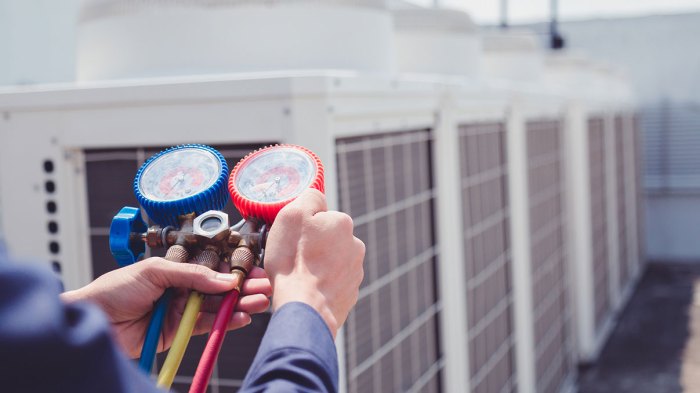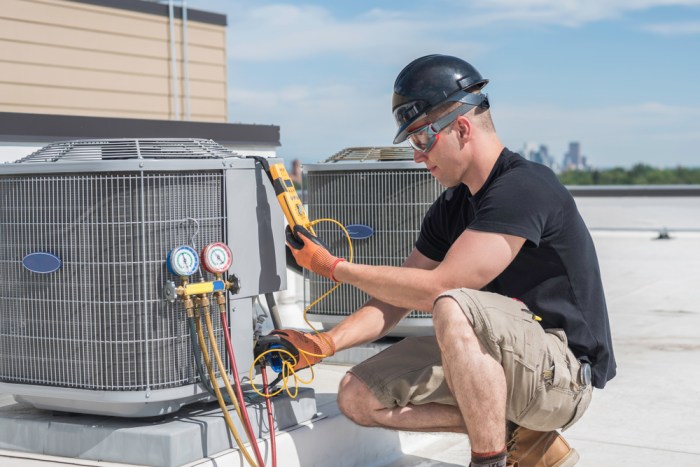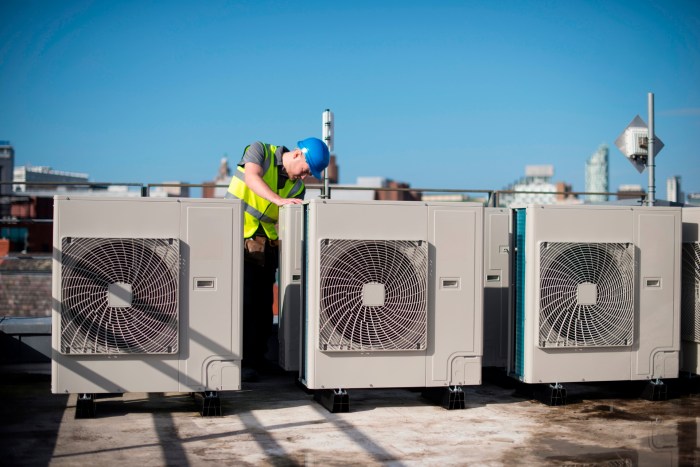Optimizing Efficiency: Commercial HVAC Maintenance Services
Embark on a journey into the realm of commercial HVAC maintenance services, where the key to enhancing efficiency and reducing costs lies. This topic delves into the crucial aspects of maintaining HVAC systems in commercial settings, shedding light on the importance of regular upkeep.
Exploring the different types of maintenance services, best practices, and cost considerations, this guide aims to equip businesses with the knowledge needed to make informed decisions regarding their HVAC systems.
Importance of Commercial HVAC Maintenance Services
Regular maintenance of commercial HVAC systems is crucial for ensuring optimal performance and longevity. By scheduling routine maintenance, businesses can improve energy efficiency, reduce operational costs, and prevent unexpected breakdowns.
Improved Energy Efficiency
Proper maintenance, such as cleaning or replacing filters, checking refrigerant levels, and calibrating thermostats, can significantly improve energy efficiency. A well-maintained HVAC system operates more smoothly, reducing energy consumption and ultimately lowering utility bills.
Cost Reduction
Neglecting maintenance can lead to inefficient operation, which in turn increases energy consumption and operational costs. By investing in regular maintenance, businesses can avoid costly repairs, extend the lifespan of their HVAC systems, and save money in the long run.
System Performance and Longevity
Failure to maintain commercial HVAC systems can result in decreased performance, uneven heating or cooling, and premature system failure. Regular inspections, cleaning, and tune-ups can help identify and address issues before they escalate, ensuring the system operates efficiently and lasts longer.
Types of Commercial HVAC Maintenance Services

Commercial HVAC systems require regular maintenance to ensure optimal performance and longevity. There are three main types of maintenance services offered for commercial HVAC systems: preventive maintenance, predictive maintenance, and reactive maintenance.
Preventive Maintenance
Preventive maintenance involves scheduled inspections, cleanings, and adjustments to prevent breakdowns and ensure the system is running efficiently. This type of maintenance helps avoid costly repairs and prolongs the lifespan of the HVAC system. By addressing potential issues before they become major problems, preventive maintenance can save businesses time and money in the long run.
Predictive Maintenance
Predictive maintenance uses data and analytics to predict when maintenance is needed based on the system’s performance. By monitoring key indicators and trends, such as energy consumption and equipment vibrations, businesses can anticipate potential issues and address them proactively. This proactive approach can help prevent unexpected breakdowns and minimize downtime.
Reactive Maintenance
Reactive maintenance, also known as corrective maintenance, involves addressing issues as they arise. While this type of maintenance is typically more costly and can lead to downtime, it is necessary for emergencies or unexpected failures. Reactive maintenance is often used in conjunction with preventive and predictive maintenance to ensure the HVAC system is operating at its best.Each type of maintenance service plays a vital role in keeping commercial HVAC systems running smoothly and efficiently.
By implementing a comprehensive maintenance plan that includes preventive, predictive, and reactive maintenance, businesses can ensure their HVAC systems operate optimally, reduce energy costs, and avoid costly repairs.
Best Practices for Commercial HVAC Maintenance
Regular maintenance of commercial HVAC systems is crucial to ensure optimal performance and prevent costly breakdowns. Here are some best practices to follow:
Comprehensive Maintenance Schedule
Creating a detailed maintenance schedule for your commercial HVAC system is essential. This schedule should include regular inspections, filter changes, component checks, and duct cleaning. By following a set schedule, you can stay on top of maintenance tasks and address any issues before they escalate.
Importance of Changing Filters
Regularly changing filters is key to maintaining good indoor air quality and ensuring the efficiency of your HVAC system. Clogged filters can restrict airflow, leading to strain on the system and reduced efficiency. By changing filters as recommended by the manufacturer, you can improve air quality and extend the lifespan of your HVAC system.
Inspecting Components
Regular inspections of components such as belts, motors, and coils are important to identify any wear and tear early on. By catching issues before they worsen, you can prevent major breakdowns and costly repairs. Inspecting components also helps ensure that your system is running efficiently, saving you money on energy costs.
Cleaning Ducts
Regularly cleaning ducts is essential for maintaining good indoor air quality and preventing the buildup of dust and debris. Dirty ducts can lead to poor airflow and distribute allergens throughout your commercial space. By keeping ducts clean, you can improve air quality and ensure that your HVAC system is running smoothly.
Hiring Commercial HVAC Maintenance Services

When it comes to selecting a provider for commercial HVAC maintenance, there are several key factors to consider. From the reputation of the company to the services offered, making the right choice can have a significant impact on the efficiency and longevity of your HVAC system.
Factors to Consider When Selecting a Provider
- Experience and Expertise: Look for a company with a proven track record in commercial HVAC maintenance and technicians who are well-trained and certified.
- Reputation and Reviews: Check online reviews and ask for references to ensure the company has a good reputation for quality service.
- Service Offerings: Consider the range of services offered by the maintenance company and ensure they align with your specific needs.
- Response Time: In case of emergencies, it is essential to choose a provider that offers quick response times to prevent disruptions in your business operations.
Comparison of Service Packages
- Basic Maintenance Package: Includes routine inspections, filter changes, and minor repairs to keep the HVAC system running smoothly.
- Preventive Maintenance Package: Involves comprehensive inspections, cleaning, and adjustments to identify and address potential issues before they become major problems.
- Full-Service Package: Offers a complete range of maintenance services, including emergency repairs and priority scheduling for regular maintenance visits.
Negotiating Contracts and Ensuring Service Quality
- Contract Terms: Review the contract carefully to understand the scope of services, pricing, and terms of agreement before signing.
- Service Guarantees: Ensure the maintenance company provides guarantees for their work and offers warranties on parts and labor.
- Communication: Maintain open communication with the provider to address any concerns or issues promptly and ensure quality service delivery.
Cost Considerations for Commercial HVAC Maintenance

Commercial HVAC maintenance services can vary in cost depending on various factors. These costs are essential to consider when budgeting and planning for the upkeep of your HVAC system.
Typical Costs Associated with Commercial HVAC Maintenance
- Regular maintenance contracts can range from $150 to $500 per year, depending on the size of the system and frequency of service visits.
- Emergency repair services can cost anywhere from $100 to $1,000 per hour, with additional charges for parts and labor.
- Replacement of major components like compressors or motors can range from $1,000 to $10,000 or more, depending on the size and complexity of the system.
Factors Affecting Pricing
- The size of the HVAC system: Larger systems with more components will generally cost more to maintain.
- The scope of services required: Basic maintenance vs. comprehensive services will impact the overall cost.
- The age and condition of the system: Older systems may require more frequent and costly repairs.
Tips for Budgeting and Planning Maintenance Expenses
- Set aside a dedicated budget for HVAC maintenance to ensure regular upkeep and prevent costly emergency repairs.
- Work with a reputable HVAC maintenance provider to establish a customized maintenance plan that fits your budget and needs.
- Consider investing in energy-efficient upgrades to reduce long-term maintenance costs and improve system performance.
Ultimate Conclusion
In conclusion, commercial HVAC maintenance services play a vital role in ensuring optimal performance and longevity of systems. By adhering to best practices and investing in proper maintenance, businesses can reap the benefits of improved energy efficiency and cost savings.
Stay on top of your HVAC maintenance to stay ahead in the game of commercial operations.
FAQ Summary
How often should commercial HVAC systems undergo maintenance?
Regular maintenance is recommended at least twice a year to ensure optimal performance and efficiency.
What are the benefits of preventive maintenance for commercial HVAC systems?
Preventive maintenance helps in identifying potential issues early, reducing the risk of major breakdowns and costly repairs.
Can commercial HVAC maintenance services help in improving indoor air quality?
Absolutely, regular maintenance such as duct cleaning and filter replacements can significantly enhance indoor air quality.




